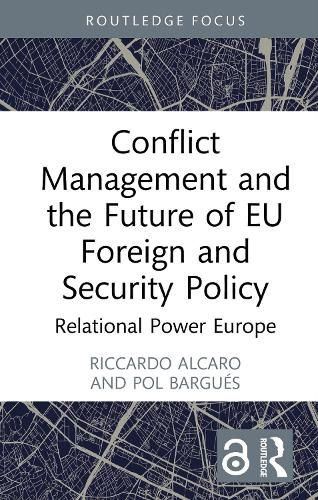Readings Newsletter
Become a Readings Member to make your shopping experience even easier.
Sign in or sign up for free!
You’re not far away from qualifying for FREE standard shipping within Australia
You’ve qualified for FREE standard shipping within Australia
The cart is loading…






This book analyses how the European Union (EU) has dealt with crises and conflicts, including Russia's invasion of Ukraine, Iran's nuclear dispute and Syria's civil war, to understand the peculiar nature of its role in international security. Rather than focusing on the institutional set-up of the EU's foreign and security policy, the authors look at the 'outer' world, concentrating on crises and conflicts impinging on Europe's security. They argue that the EU and its member states' policies are constrained by systemic factors such as acute geopolitical rivalries and the fragmentation of regional governance systems, as well as by multi-source internal contestation of policies across member states. Hence, building on pragmatist-informed analysis they show that the EU's actorness in international security is first and foremost constituted by interactions with its domestic and systemic context, and as such it should be understood as a 'relational power'.
This volume will be of great use to scholars and students of International Relations, European Studies, Security, Conflict and Peace Studies, and Diplomacy Studies seeking to deepen their understanding of the subject.
$9.00 standard shipping within Australia
FREE standard shipping within Australia for orders over $100.00
Express & International shipping calculated at checkout
This book analyses how the European Union (EU) has dealt with crises and conflicts, including Russia's invasion of Ukraine, Iran's nuclear dispute and Syria's civil war, to understand the peculiar nature of its role in international security. Rather than focusing on the institutional set-up of the EU's foreign and security policy, the authors look at the 'outer' world, concentrating on crises and conflicts impinging on Europe's security. They argue that the EU and its member states' policies are constrained by systemic factors such as acute geopolitical rivalries and the fragmentation of regional governance systems, as well as by multi-source internal contestation of policies across member states. Hence, building on pragmatist-informed analysis they show that the EU's actorness in international security is first and foremost constituted by interactions with its domestic and systemic context, and as such it should be understood as a 'relational power'.
This volume will be of great use to scholars and students of International Relations, European Studies, Security, Conflict and Peace Studies, and Diplomacy Studies seeking to deepen their understanding of the subject.